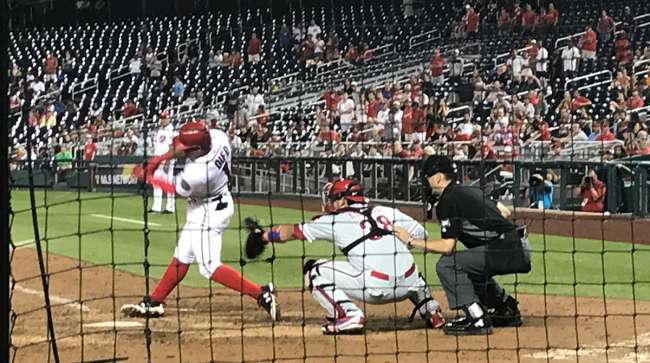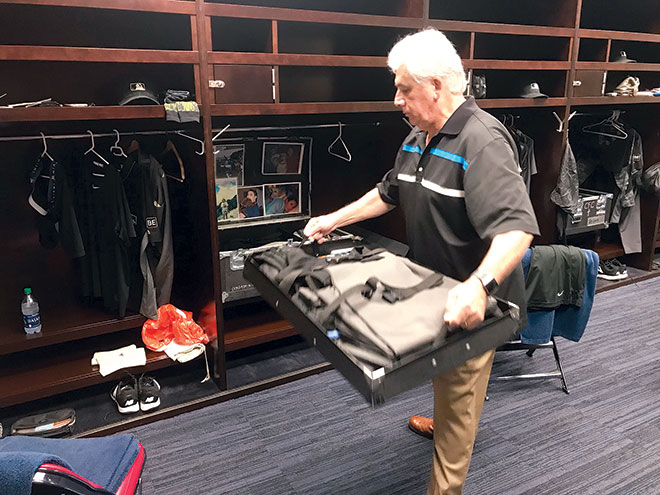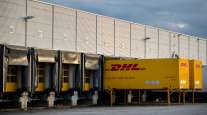Senior Reporter
Shippers Score With Safe Delivery of MLB Umpires' Gear

On July 17, the best Major League Baseball players will play in the game’s 89th All-Star Game at Nationals Park in Washington, D.C.
While much of the attention will be on the American and National League all-stars, a third team is on the field — the umpires.
From the beginning of March and start of spring training to the end of October and the final World Series game, the 76 full-time MLB umpires (and 15 Triple-A umpires who cover vacations and injuries) travel from city to city. But unlike teams, every game is a road game — unless they live in a city with a major league team. Rained out and rescheduled games, injuries and other factors sometimes can mean last-minute schedule changes and additional travel.
* * *
Twenty-six-year veteran umpire and Crew Chief Larry Vanover and his umpiring partners — David Rackley, Mark Wegner and Chris Guccione — are in a hurry.
It is 1:30 a.m., and they are leaving Nationals Park in Washington, D.C., after umpiring the Nationals’ Sunday night game versus the Philadelphia Phillies, an 8-6 Washington win that included a 38-minute rain delay.
The clock is ticking to get the umpires and their equipment to the next city. Two companies, DHL Same Day of Sterling, Va., and Crane Cartage Freight Services of Houston, are responsible for making sure that before the first pitch is thrown, the umpires’ 90-pound equipment trunks are delivered to the next ballpark, no matter when the last game ended, and when the next one starts.

Umpire Larry Vanover packs his gear after a game. (Dan Ronan/Transport Topics)
In just 18 hours, Vanover, Rackley and Guccione will be in a new city and different ballpark when the Cardinals play the Cleveland Indians in St. Louis. Another umpire, Hunter Wendelstedt, will rejoin them after a few days at home. Wegner is on his way to San Francisco to get back with his regular crew for a series with the Giants and the Colorado Rockies.
During one stretch in 2016, Vanover’s crew umpired six games in six days in four different ballparks. While it is rare to go from coast-to-coast in one day, it does happen. One Sunday night, Vanover’s crew was in New York’s Yankee Stadium and the next night their game was in AT&T Park in San Francisco. While teams fly charter, umpires fly commercial. When Vanover was selected for the 2017 World Baseball Classic tournament, a DHL truck came to his house before he traveled to Japan. When he and other members of his international crew arrived at the Tokyo Dome, all of their equipment was unloaded and ready to go.
“If MLB has a need at 2 o’clock on a Sunday morning, we are going to jump,” said Pat Mulroney, DHL Same Day project service manager. DHL Same Day had been shipping all of the umpires’ equipment since 2005. This spring, Crane was awarded a portion of the business, and it moves the gear of two of the 19 four-man crews. Last season, DHL shipped umpires’ equipment 1,681 times with one missed connection; 99.94% of the time everything went smoothly. So far in 2018, it has had 651 successful jobs. And Crane said it has had no issues, either.

Drivers for American Expediting will transport the umpires' gear to BWI Marshall Airport to be flown to the next destination. (Dan Ronan/Transport Topics)
“When I walk into the ballpark, my equipment trunk is sitting there, unpacked. The uniforms are clean, the shoes are shined, it’s all hanging up in my locker ready to go. I don’t have to worry about it,” Vanover told Transport Topics. “We know when we get to the next ballpark, it’s going to be there.”
Said Dan Wallin, the Nationals’ equipment manager and umpires room attendant: “It takes a lot of work and coordination more than anything to get it done. They give us schedules [that show] exactly when stuff is supposed to come in.”
On a travel day, Vanover and his crew will spend 15 minutes before the game meticulously packing their protective equipment, multiple uniforms, several pairs of shoes, weather gear and other items. They will leave out only the uniform and equipment they need for that night’s game.
When it is over, the umpires head to their hotel to get some sleep before their morning flights. Now it is up to Wallin and two drivers with DHL subcontractor American Expediting — Glen Van Scyoc and Huen Watson — to get the loaded trunks out of the ballpark and to BWI Marshall Airport, 36 miles away, where American Airlines had flights as early as 5:21 a.m. to St. Louis.
“It will leave here tonight, and then it’s on the first flight out in the morning, and it will be there by noon,” said Wallin.
“As a fan of the game, and someone who takes pride in his job, of course, I am going to feel good about the responsibility of handling this,” said Van Scyoc, who has been at ballparks in Washington, Baltimore, Philadelphia and other cities, picking up and delivering umpires’ equipment for eight years. “This is something I am proud of, that anything I have been involved in there’s not been a mistake, where a crew’s gear didn’t get somewhere on time or to the right place.”
Each MLB stadium has several extra uniforms and protective equipment for emergencies, but the extra gear is rarely needed.
“It’s so infrequent I have to really search to remember when it happened. I was in Toronto, maybe 15 years ago,” Vanover said.
DHL and Crane have teams designated for freight that needs to be shipped at irregular hours and must always arrive on time, but occasionally there have been close calls. Such was the case earlier this season when snow and cold weather played havoc with the schedule.

Umpire Mark Wegner packs his bags, moving on to the next game. (Dan Ronan/Transport Topics)
“We had an incident in Minneapolis when the flights were canceled for two days due to snow. We were trying to get trunks to Yankee Stadium, and we finally got a flight out the day of the game. I think it landed at LaGuardia at 3, 3:30. The game was at 7, and we delivered the trunks at a quarter to six.”
“You’ve always got to anticipate a problem. Because again, these trunks have to be there and they have to be on time without fail,” Crane President Ron Talley said. “There are a lot of things we have to do every day to make sure these moves happen. It’s not just pick them up, take them to the airline and drop them.”
Once the trunks arrive in the next city, in this case for Vanover’s crew in St. Louis and San Francisco for Wegner, two drivers are waiting at the airport to take the equipment to the ballpark and the umpires room, where it will be cleaned and neatly prepared for the next game.
“I don’t touch it, I don’t move it, and I don’t worry about it. They are that good,” Vanover said.
And when the umpires walk out on the field, a handful of people who make this happen all season long will enjoy the moment, and then continue planning for the next shipment, to the next ballpark.




